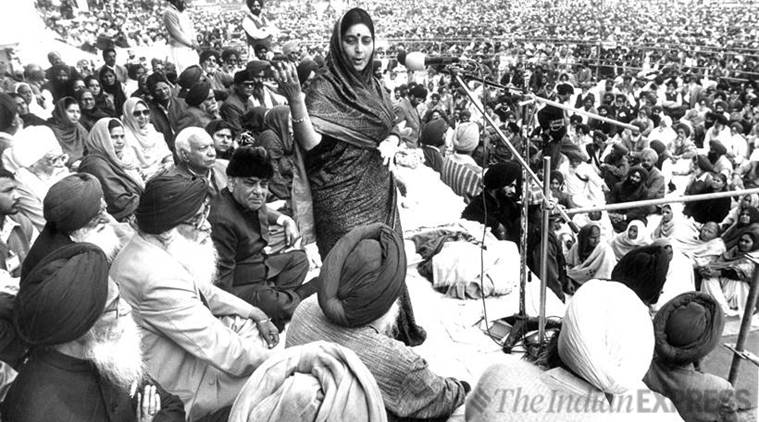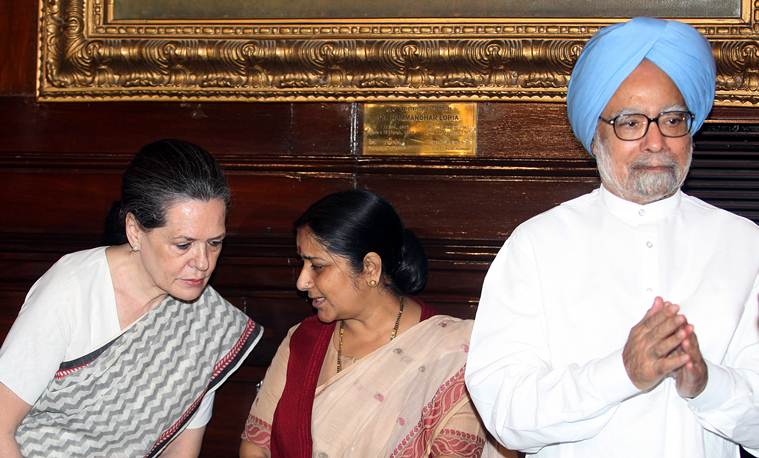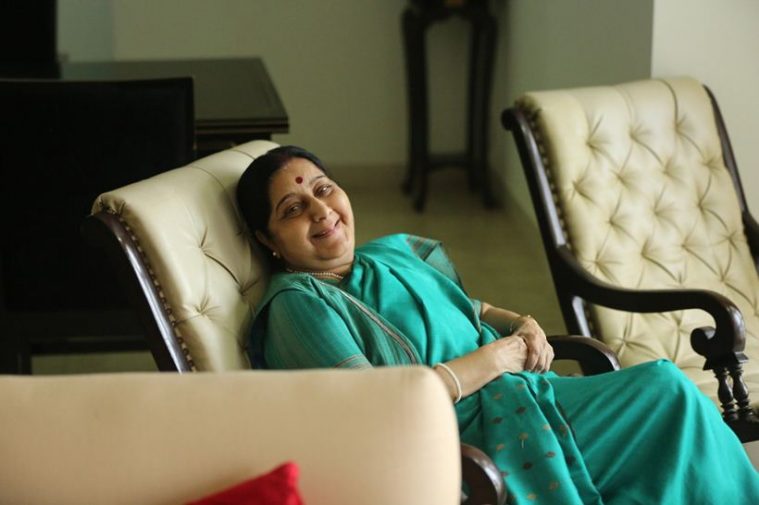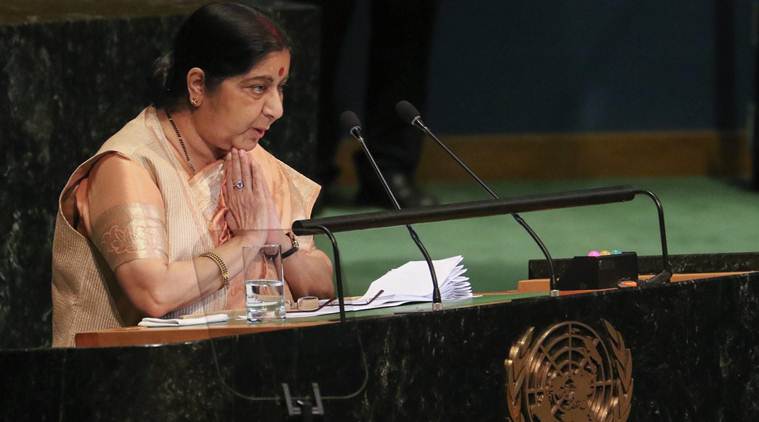
Former External Affairs minister and BJP veteran Sushma Swaraj passed away Tuesday night following a cardiac arrest. Swaraj who had earned a formidable reputation in helping overseas Indians in distress came across as someone who was the “People’s Foreign Minister”. Her last rites will be held Wednesday at the Lodhi crematorium in New Delhi.
Starting her political career under the Janata Party, Swaraj was elected to the Haryana assembly in 1977 and became a state minister at the age of 25. Her rise within the BJP, considered a party of conservatives, was a testimony to her political acumen, courage and mass appeal. She came into national limelight because of her ideologically fierce oratory in Lok Sabha.
In the 1999 Lok Sabha elections, Sushma Swaraj jumped into the electoral fray against Congress president Sonia Gandhi, heading to Bellary in Karnataka. Though she was pitchforked by the BJP at the very last moment to contest against the Congress president, she learnt a smattering of Kannada to connect with the electorate in Bellary, forcing a keen contest.
Before the BJP was cast aside in the 2004 elections — it was the start of the BJP’s decade-long political wilderness — Swaraj had raised the political stakes by declaring she would shave her head if “Italy-born” Sonia Gandhi was elected as Prime Minister. It defined her political contest with the Congress leadership.
Here’s a look at some of Sushma Swaraj’s memorable speeches
Sushma Swaraj’s last rites to be held today. Follow LIVE Updates
1996 trust vote speech of Sushma Swaraj

Defending the no-confidence motion against the then prime minister Atal Behari Vajpayee, Swaraj in 1996 gave one of her most fiery speeches in Parliament. Her political articulation, drawn from India’s mythological traditions, endeared her to the common man who could grasp her arguments.
“Mr. Speaker, you can accept any definition of the mandate, but you cannot ignore what is happening in this house. Before today, there used to be the Government of one party, and a scattered opposition. But today, we’ve got a scattered government and a united opposition. Doesn’t this scene describe the open defiance of the people’s mandate?” she said. She explained why the BJP had to step down and equated her analogies to the Ramayan and Mahabharat, leading to praises from the benches.
“When one Manthara and one Shakuni can keep the likes of Lord Rama and Yudishthir out of their right to rule, then if you take a look around this House, you’ll find many Manthras and many Shakunis opposing us. How can we stay in power? I suppose it (no-confidence motion) is the nature of Ramrajya and Surajya,” she said. The then Speaker PA Sangma interrupted her saying, “Please, don’t make your speech so interesting!”
In the same speech, she also referred to Article 370. “Mr. Speaker, we are communal, because we advocate the singing of Vande Matram, Yes, we are communal, because we fight for the respect of the national flag, we are communal, because we want to abolish the 370, we are communal, because we want to put an end to discrimination based on caste and creed in this country, yes we are communal, because we want to get the Uniform Civil Code implemented in this country. We are communal because we want the voices of the Kashmiri refugees to be heard,” she said.
In Photos | See rare photos of former External Affairs Minister Sushma Swaraj
A poetic duel between Manmohan Singh and Sushma Swaraj

As the Leader of Opposition in Lok Sabha, Swaraj often lead the BJP’s attacks against Manmohan Singh’s UPA-I government. In 2013, she engaged in an unusual duel with the then prime minister over corruption charges. Both Singh and Swaraj used Urdu couplets to trade charges against each other.
“Humko hai unse wafa ki umeed, jo nahi jaante wafa kya hai (We hope for loyalty from those who do not know the meaning of the word),” the prime minister said, quoting famous Urdu poet Mirza Ghalib.
After his speech, Swaraj with a smile on her face, stood up to say, “Kuch toh majboorian rahee hongee, yun hee koi bewafa nahee hota (There must have been some compulsion, one is not disloyal for no reason at all).”
On another occasion, she told Singh, “Tu idhar udhar ki baat na kar/ yeh bata ki kafila kyun luta/hamein rehzano se gila nahin/teri rehbari ka sawaal hai (Do not subterfuge, tell us why the caravan was looted. We have no complaint with the passersby, it is a question of your leadership.)”
In his reply, Singh said, “Maana ki tere deed ke kaabil nahin hoon main, tu mera shauk dekh, mera intezar dekh (I agree I am not worth your looking at me; but see my keenness, my anticipation.)”
Read | India’s ‘Supermom’ who blazed a trail in Twitter diplomacy
Sushma Swaraj defending herself from Lalit Modi controversy
Soon after being sworn-in in the Modi Cabinet, Sushma Swaraj faced accusations in 2015 of having lobbied on behalf of former Indian Premier League chief Lalit Modi, who was then in London and seen as a fugitive. In an impromptu speech in Parliament, Swaraj defended herself and said she had never “requested” or made a “recommendation” to British authorities to provide travel documents to Lalit Modi.
She said she had only helped his ailing wife on “purely humanitarian grounds”, and if that was seen as a crime, she was ready to “undergo any punishment”. Addressing Speaker Sumitra Mahajan, she said: “I want to ask what would you have done if you were in my place? What would Soniaji have done had she been in my place? Would you have left her to die? “If it is a crime to help a woman like her, I want to say that I have committed this crime and, standing in this House, I accept my crime before the entire nation. I am ready to undergo any punishment this House may want to give me.”
Sushma Swaraj’s Parliament speech on Kulbhushan Jadhav

During her tenure as the Foreign Minister under Modi government, Sushma Swaraj raised multiple times the issue of Kulbhushan Jadhav, the former Indian Navy officer on death row in Pakistan. Swaraj warned the Pakistani government that if the death sentence is carried out by them, it will be regarded “as an act of premeditated murder”.
On Pakistan’s treatment meted towards Jadhav’s wife and mother in Islamabad, Swaraj condemned the “obnoxious” behaviour and called it a “gross violation” of their human rights. Saying that Pakistan presented Kulbhushan Jadhav’s wife Chetna and mother Avanti as “widows” in front of him, she said Jadhav wondered if something “unfortunate” had happened in the family and asked about the well-being of his father.
Swaraj said that while Pakistan had portrayed the meeting as a humanitarian gesture, “the truth is that both humanity and compassion were missing during the meeting that was arranged on humanitarian and compassionate grounds.” Saying that Pakistan had “misused” the “emotional moment” as “an instrument to further its propaganda”, Swaraj added that “there are not enough words to condemn the same.”
Sushma Swaraj at 73rd Session of UNGA

In 2018, Swaraj, the then foreign minister of India flayed Pakistan at the 73rd United Nations General Assembly debate for accusing India of sabotaging the dialogue process. Reiterating India’s stand that “talks and terror” cannot go together, Swaraj accused Pakistan of being an “expert in trying to mask malevolence with verbal duplicity.
“In our case, terrorism is bred not in some faraway land, but across our border to the west. Our neighbour’s expertise is not restricted to spawning grounds for terrorism; it is also an expert in trying to mask malevolence with verbal duplicity,” she said.
In 2017, Swaraj had famously said that while India had created IIMs, AIIMS and IITs which produced doctors and engineers, Pakistan had produced terrorists and terrorist camps. In 2016, she had told the UNGA that Pakistan remained in denial despite confessions by terrorists, which were “living proof of Pakistan’s complicity in cross-border terror”.